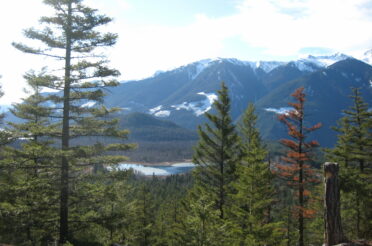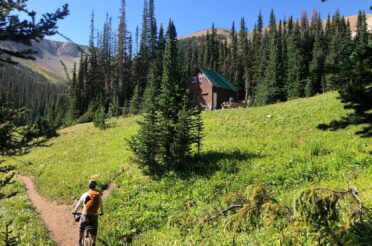Why I Stay

It’s that time of year again, when this summer’s interns move on to the next chapter of their lives, their next learning experience, one more step on their transformational journey. I’ve spent the summer and fall with these people, guided together, worked in the office, shared everything, 24/7. And now they’re gone. Some I might see again, but you never know.
And I stay.
This is my third end of season, the third time I’ve watched most of the people I’ve spent my summer with leave. But still I have no desire to go with them. I’m here for one more season (and many more after that).
I stay for the culture and community I’ve never felt anywhere else. I stay for the nature connection, riding the mountains with the horses who are among life’s greatest teachers, for growing as a person and a spiritual being.
Here, I’ve become empowered in ways I never expected to, let alone thought I would find, here or anywhere else. I’ve learned about the concept of a lead mare from Fortress, Pearson and Meg, our most experienced mares. These horses each have their own unique way of leading and each is just as effective as the other. Fortress is calm, stable and reliable and that energy seems to be contagious to her herd mates. Meg is bossier and makes sure they follow her. Pearson won’t put up with the other horses acting out and shows them how it should be done. I’d like to think my style of leadership is like Fortress’ and in the last two weeks I’ve had lots of opportunity to practise, as I work on getting the job done on my own work and working with everyone else to see that they are also getting their jobs done.
Recently, I drove the horse trailer for the first time with horses in it. Over the last year or so, I’ve been gradually building up my trailer driving skills, first driving it empty, then with light loads. Now I was ready and with no one else around to drive the trailer, it was my opportunity to step up to the plate and bring the horses back to the ranch. Willy, Blue and Castle all loaded easily and then we were on the road. I was a little nervous about driving. Although I knew the road was good and I would be driving slow, I was worried about sliding down the hill. I’d jack-knifed the truck and trailer last year after sliding on some ice hidden under snow. I didn’t want to repeat that. But I drove slow and carefully and everything was fine! Once we got back to the ranch, I felt a huge sense of accomplishment and empowerment. I’d achieved a major goal and done it well. I might not be able to drive the trailer to all the places Kevan could, but it was a great start! Now, it was just practice. Oh, and I have to learn how to reverse with a trailer!
On a two week sheep hunt, I learned how to navigate the Shulaps Range from end to end, hardly using trails. We spotted an elk, a very rare sight here in the Chilcotin Mountains. I got my assistant hunt guide licence this fall and had the opportunity to guide solo for the first time as Kevan had to go back to the ranch in the middle of our hunt and take care of Jack who had cut his foot on a piece of jade. I had a lot of insecurities about guiding solo. What if we didn’t see any sheep – would it look like I hadn’t tried hard enough? What if we saw sheep – then I had to identify if they were legal to shoot and what if I made a mistake and we shot an illegal ram? What if we shot the sheep and then had to gut and skin it and prepare the meat? I’d never done that before and didn’t know what to do. In the end, we didn’t see any sheep, but my hunter didn’t think I hadn’t tried hard enough, instead, he was the one who said we should go back to camp. I’d also found my way along a new trail I’d only taken once before, so I was also relieved we hadn’t got lost. Another sense of accomplishment and empowerment, I was ready for more.
I’ve learned a lot from our horses, about when to take the lead and when to let them find the way, how to lead with confidence and a calm attitude, a lot about herd dynamics. But hopefully I’ve also taught some of the horses something. This year, I took on the task of teaching Apache to be a riding horse. For several years he’s been an amazing pack horse, but it’s time we start riding him. I started off just putting the saddle and bridle on him, building up to getting on him. In the corral, I got on him and “rode” him for the first time. He didn’t know what the commands meant, so Kevan led him around while I kicked, clicked and steered left and right. Apache picked it up quickly. Soon I realized that summer wasn’t the most practical time to train every day with a horse and that it would be a winter project, but Apache made progress in just the few training sessions he had. Aslo, I took on the task of riding Nean on every pack trip to get him lots of experience as a lead horse. There’s a saying here that the rookie guides want the spunky horses and the experienced guides want the calm, stable, reliable ones. After riding Nean all summer and fall, I felt very appreciative for Fortress, Scout, Pika and all the other calm horses I usually rode. But hopefully Nean learned something from his time as a lead horse. Even if he still jumps sideways when he sees grouse.
This year was a white bark pine year. Three years out of every ten, the white bark pine trees produce their cones. The grizzly bears, Clark’s nutcrackers and squirrels feast on these nutritious pine nuts. On several trips this year, we collected white bark pine cones, educating our guests about their importance in the food chain and explaining that while they thrive here, in other areas of BC, they are an endangered species. That’s why we harvest them and give them to conservation charities who replant them in other areas of BC. This is how we contribute to conservation on a provincial scale and help secure the future of white bark pine trees throughout this province.
Then there’s the ranch culture. I’m sure there are very few guest ranches / hunting outfits (and few workplaces in general) where there are more women than men and the women occupy many of the leadership positions. As responsibility is taken not given, anyone can be a leader here if they choose and take ownership for the role. That doesn’t mean it’s easy to be a leader, but it means the learning opportunity is there. I wouldn’t describe myself as a natural leader or manager. I work best when I have my own project, my own focus, so working as a team, especially in a leadership role is still a big challenge for me. But I’m still working on it. Our community is also mostly made up of people under thirty. We accept interns who have no experience in what they have come here to do, but they take initiative and ownership to learn it all when they get here. We do what needs to be done, when it needs doing and with a positive attitude. The atmosphere is friendly, cooperative, focused and we’re successful in the tasks we take on.
As I wrote this story, a line in a country song sung “do what you love and call it work”. Well, that’s what I do every day here. And as another season’s interns leave for whatever they do next, I stay here, knowing I’ll have more of the above experiences, all through the winter, next summer and into perpetuity.
That’s why I stay.
Charl



